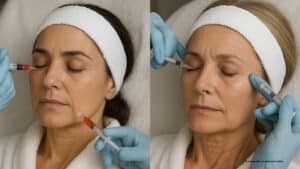In the realm of regenerative medicine, the use of stem cells for tendonitis marks a groundbreaking frontier in the quest for effective and natural healing.
Stem cell therapy, harnessing the potential of mesenchymal stem cells derived from sources like bone marrow, emerges as a promising approach to address the challenges of tendonitis. This innovative treatment seeks to stimulate the body’s inherent regenerative processes, offering a potential remedy that goes beyond conventional methods.
Join us on a journey where science meets nature, exploring the transformative power of stem cells for tendonitis and envisioning a future where regenerative solutions redefine the landscape of tendon health and recovery.
What Does Stem Cells For Tendonitis Mean?

Stem cells for tendonitis introduce a revolutionary and natural approach to address tendon-related problems in the body. Tendonitis, characterized by inflammation in the tendons, often presents challenges for conventional treatments.
Stem cells, possessing remarkable transformative abilities, act as superheroes by stimulating the body’s inherent healing processes. Derived from sources like bone marrow, these cells are strategically introduced to the affected area, working to reduce inflammation and jumpstart the body’s natural healing mechanisms.
Explanation

Stem cell tourism therapy for tendonitis emerges as a promising field in regenerative medicine, providing a new dimension to the treatment landscape. It’s akin to infusing the body with a surge of healing power, amplifying the effectiveness of natural recovery.
This collaborative effort between science and nature reshapes how we approach and treat tendonitis, offering a hopeful future where regenerative solutions take the lead in optimizing tendon health. The journey unfolds as a fascinating exploration into more effective, natural, and transformative recoveries from tendon issues. According to the Stem Cells Int group, the effect of uniaxial tensile cyclic loading regimes on matrix organization and tenogenic differentiation of adipose-derived stem cells encapsulated within 3D collagen scaffolds.
When the autologous stem cells are re-injected, they accelerate healing and regeneration. In most cases, only one stem cell injection is necessary in order for the injury or dysfunctional muscle or tendon to recover. Stem cell injections also contain hyaluronic acid, which lubricates joints and tendons, easing pain and helping to restore mobility.
So many people are told that surgery is the only option when dealing with symptoms of foot and ankle pain. Stem cell therapies can help accelerate and promote the healing of bone and tendon injuries.
One of the main advantages of using pluripotent stem cells is that they potentially represent an unlimited source of tenocytes, the cells in tendons and ligaments. Ankle arthritis is also a common condition experienced by many patients as they age or after a sports injury.
Regenerative medicine is an exciting new area of clinical practice that focuses on the natural healing of chronically injured tissues that have become unable to heal themselves. Comparing the effects of eccentric training and static stretching exercises in the treatment of patellar tendinopathy which is a controlled clinical trial.
Significance of Stem Cells for Tendonitis

Regenerative Potential
Stem cells possess the unique capability to transform into various cell types that offer the promise of regenerating damaged tendon tissue affected by tendonitis.
Reduced Inflammation
Stem cells exhibit anti-inflammatory properties, alleviating the inflammatory response linked to tendonitis. This reduction in inflammation aids in pain relief and supports the healing process.
Minimally Invasive Procedure
Stem cell therapy for tendonitis typically involves minimally invasive procedures such as injections at the affected site. This approach minimizes surgical risks, promotes quicker recovery, and lessens the overall burden on the patient.
Potential Alternative to Surgery
Stem cell therapy serves as a potential non-surgical alternative for individuals dealing with tendonitis, offering an option beyond traditional surgical interventions and presenting a potentially less invasive path to recovery.
Personalized Treatment Plans
Stem cell therapy allows for the creation of personalized treatment plans tailored to the individual’s unique needs. This customization ensures that the therapy aligns with the specific characteristics of the tendonitis and the overall health of the patient.
Causes of Tendonitis
Tendonitis, characterized by inflammation of the tendons, can result from various contributing factors. Understanding the causes is essential for effective management and preventive measures. Here’s an in-depth exploration:
Overuse and Repetitive Strain
Prolonged engagement in repetitive activities or movements without adequate rest can strain the tendons, leading to microtrauma and inflammation. Common in professions or sports involving repetitive motions, this overuse can gradually wear down the tendon’s resilience.
Aging and Degeneration
As individuals age, tendons undergo natural degenerative changes. The aging process can reduce the tendon’s elasticity and resilience, making it more susceptible to inflammation. This degeneration can be exacerbated by factors such as inadequate nutrition and chronic stress on the tendons.
Direct Injury or Trauma
Acute injuries resulting from sudden impacts, falls, or accidents, can directly damage tendons. Trauma may cause tears or strains in the tendon structure, triggering an inflammatory response as the body attempts to repair the injured tissue.
Inflammatory Conditions
Underlying inflammatory disorders including rheumatoid arthritis and systemic lupus erythematosus, can contribute to tendonitis. The inflammatory processes associated with these conditions can affect the tendons, leading to chronic inflammation and increased vulnerability to tendon injuries.
How Do Stem Cells for Tendonitis Work?

Stem cell therapy for tendonitis involves injecting carefully harvested stem cells directly into the injured tendon, leveraging their unique abilities for healing. These cells possess anti-inflammatory properties, reducing inflammation and providing pain relief.
Stem cells actively regenerate damaged tissue by transforming into tendon-specific cells, stimulating natural healing mechanisms. Additionally, they release growth factors that foster angiogenesis and the formation of crucial extracellular matrix components.
The therapy is tailored to individual conditions, considering factors like the extent of damage and overall health. Scar tissue formation is minimized, preserving tendon flexibility.
Stem cell therapy not only addresses existing tendonitis but also prevents further degeneration, promoting a resilient tendon structure. Overall, this approach offers a targeted, regenerative solution for tendonitis, showcasing the potential of personalized and innovative treatments.
Benefits of Stem Cells for Tendonitis

Regenerative Healing
Stem cell therapy for tendonitis actively engages in regenerative healing, leveraging the unique capabilities of stem cells to facilitate the repair and restoration of damaged tendon tissue. This process contributes to the overall recovery and functionality of the affected tendon.
Inflammation Reduction
The anti-inflammatory properties of stem cells play a crucial role in reducing inflammation at the site of tendon injury, providing effective relief from pain associated with tendonitis. This reduction in inflammation is essential for creating a conducive environment for healing.
Scar Tissue Minimization
Stem cell therapy minimizes the formation of scar tissue within the injured tendon. This is significant as it helps preserve the natural flexibility of the tendon, preventing potential long-term complications and maintaining optimal functionality.
Precision in Treatment
Stem cell therapy offers a precise and targeted treatment approach by directly injecting stem cells into the specific site of tendon injury. This targeted delivery enhances the therapeutic impact of the treatment, focusing on the area that requires regeneration.
FAQs

How does stem cell therapy differ from traditional treatments for tendonitis?
Stem cell therapy differs by leveraging the regenerative potential of stem cells to actively repair damaged tendon tissue, offering a more targeted and innovative approach compared to conventional treatments.
Is stem cell therapy for tendonitis suitable for everyone?
While stem cell therapy shows promise, suitability depends on factors like the extent of tendon damage and overall health. A consultation with a healthcare professional can determine individual eligibility.
What is the recovery time after stem cell therapy for tendonitis?
Recovery times vary but are generally quicker than traditional surgery. Patients often experience reduced downtime and a faster return to regular activities.
Are there any risks or side effects associated with stem cell therapy for tendonitis?
The procedure is generally considered safe with minimal risks. However, individual responses may vary, and it’s essential to discuss potential side effects with the healthcare provider.
How long does it take to see results from stem cell therapy for tendonitis?
Results can vary, and some individuals may experience improvements over weeks to months as the regenerative process takes effect. Patience is key for optimal outcomes.
Are all platelet-rich plasma (PRP) and Bone Marrow Aspirate Concentrate (BMAC) stem cell therapies the same?
No, Platelet Rich Plasma (PRP) and Bone Marrow Aspirate Concentrate (BMAC) are not the same. PRP primarily involves concentrated platelets, while BMAC includes a higher concentration of various cells, including mesenchymal stem cells.
Conclusion

Stem cell therapy presents a promising and innovative solution for tackling tendonitis. With its regenerative potential and a tailored approach, it holds the promise of reducing inflammation, mitigating scar tissue formation, and fostering enduring tendon health.
Ongoing research continually refines our comprehension and utilization of stem cells in addressing tendonitis with early outcomes and patient testimonials highlighting its positive influence. As the realm of regenerative medicine advances, the trajectory of stem cell therapy for tendonitis suggests a transformative impact on musculoskeletal treatments, instilling fresh optimism for those in search of effective and personalized remedies.
Book An Appointment With Stem Cells LA

Are you tired of the persistent discomfort of tendonitis? Stem Cells LA offers a revolutionary solution tailored just for you. Our seasoned professionals specialize in regenerative medicine, ensuring the highest standards of care. Benefit from a personalized treatment plan designed to address your specific tendonitis needs.
Harness the power of cutting-edge stem cell technology, providing a natural and effective approach to healing. Say goodbye to traditional treatments and welcome a transformative journey with Stem Cells LA.
Take the first step towards freedom from tendonitis by scheduling a consultation today. Our experts will guide you through a comprehensive approach to renewing your vitality. Seize the opportunity to reclaim a life free from the constraints of tendon pain. Your journey to optimal tendon health starts here – make the choice that transforms. Act now, and let Stem Cells LA be your partner in achieving a life without the limitations of tendonitis.
Contact Information:
???? Call or Text: 310-281-6160
???? Visit Us:
1970 S. Prospect Ave. Suite 2
Redondo Beach, CA 90277


